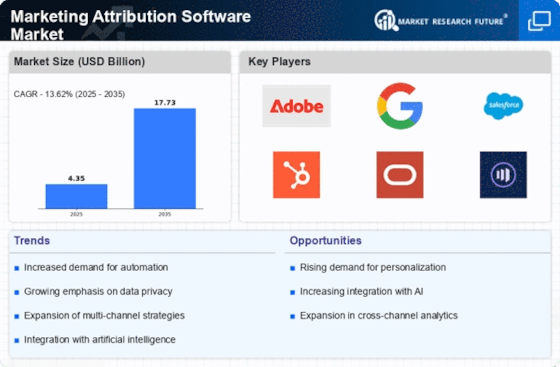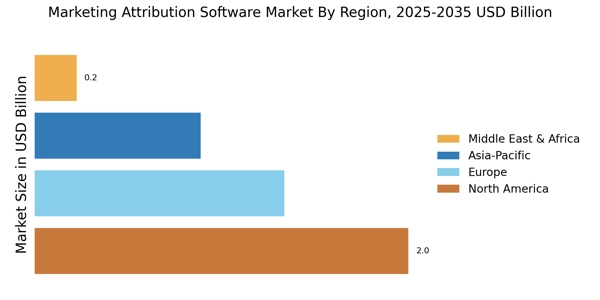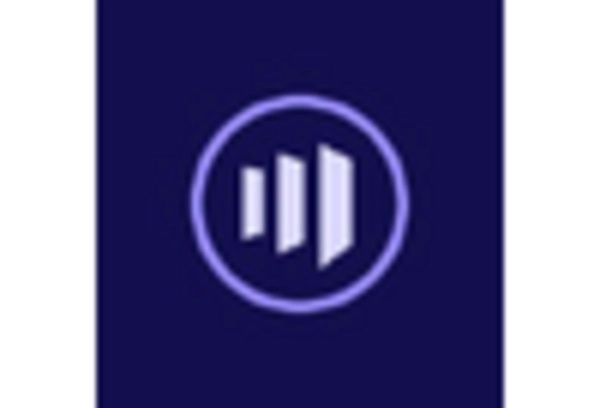Growing Demand for Data-Driven Marketing
The Marketing Attribution Software Market is experiencing a surge in demand as businesses increasingly recognize the value of data-driven decision-making. Companies are leveraging advanced analytics to optimize their marketing strategies, leading to a projected growth rate of approximately 15% annually. This trend is fueled by the need for precise measurement of marketing effectiveness, enabling organizations to allocate resources more efficiently. As a result, marketing attribution software is becoming essential for businesses aiming to enhance their return on investment (ROI) and improve customer engagement. The ability to track customer interactions across various channels allows marketers to refine their campaigns, thereby driving the growth of the Marketing Attribution Software Market.
Increased Investment in Digital Marketing
The Marketing Attribution Software Market is benefiting from the heightened investment in digital marketing initiatives. As businesses shift their focus towards online channels, the need for effective attribution tools becomes paramount. Recent data indicates that digital marketing expenditures are projected to surpass traditional marketing budgets by a significant margin, with an expected growth rate of 18% annually. This shift necessitates the use of marketing attribution software to accurately measure the performance of digital campaigns across various platforms. By providing insights into customer behavior and campaign effectiveness, these tools enable marketers to optimize their strategies and maximize ROI. Consequently, the Marketing Attribution Software Market is poised for substantial growth as organizations increasingly recognize the importance of data-driven marketing in a digital-first landscape.
Emergence of Omnichannel Marketing Strategies
The Marketing Attribution Software Market is witnessing a transformation due to the rise of omnichannel marketing strategies. Businesses are increasingly adopting a holistic approach to customer engagement, which necessitates the integration of multiple marketing channels. This shift is expected to propel the market, as companies seek tools that can provide comprehensive insights into customer journeys. According to recent estimates, the omnichannel marketing sector is projected to grow by over 20% in the coming years. Marketing attribution software plays a crucial role in this landscape by enabling marketers to understand the impact of each channel on customer behavior, thus enhancing the effectiveness of their campaigns. This trend underscores the importance of sophisticated attribution models in the Marketing Attribution Software Market.
Regulatory Compliance and Data Privacy Concerns
The Marketing Attribution Software Market is also shaped by the growing emphasis on regulatory compliance and data privacy. As data protection regulations become more stringent, businesses are compelled to adopt marketing attribution solutions that ensure compliance with laws such as GDPR and CCPA. This trend is driving the demand for software that not only tracks customer interactions but also safeguards sensitive information. Companies that prioritize data privacy are likely to gain a competitive edge, as consumers increasingly prefer brands that demonstrate transparency and responsibility in handling their data. The need for compliance is expected to propel the Marketing Attribution Software Market, as organizations seek solutions that align with regulatory requirements while still delivering robust attribution capabilities.
Advancements in Artificial Intelligence and Machine Learning
The Marketing Attribution Software Market is significantly influenced by advancements in artificial intelligence (AI) and machine learning (ML). These technologies are revolutionizing how marketers analyze data and derive insights. AI-driven attribution models can process vast amounts of data in real-time, providing marketers with actionable insights that were previously unattainable. The integration of AI and ML is expected to enhance the accuracy of attribution, allowing businesses to make more informed decisions. As organizations increasingly adopt these technologies, the Marketing Attribution Software Market is likely to experience accelerated growth, with projections indicating a potential market size increase of 25% by 2026. This technological evolution is reshaping the competitive landscape, making it imperative for businesses to invest in advanced attribution solutions.

















